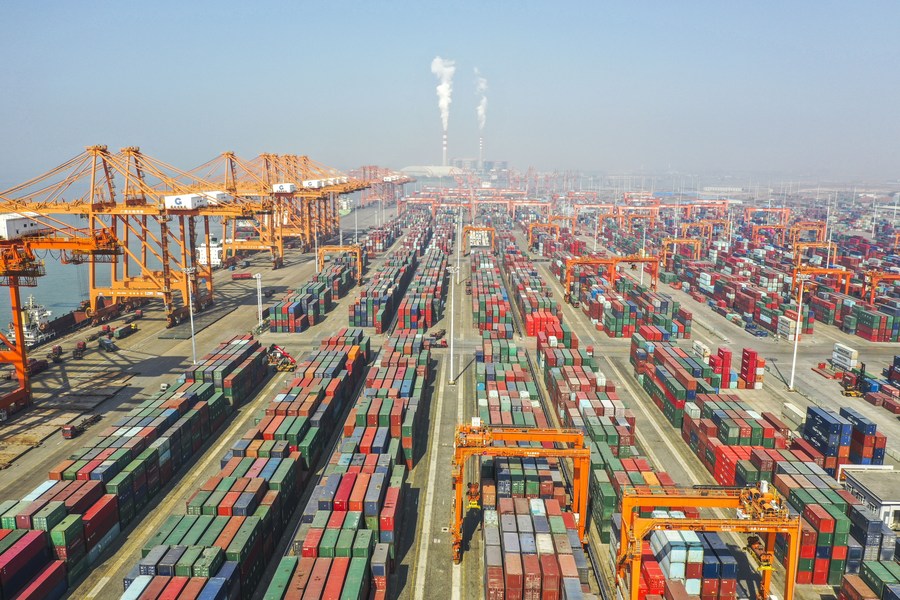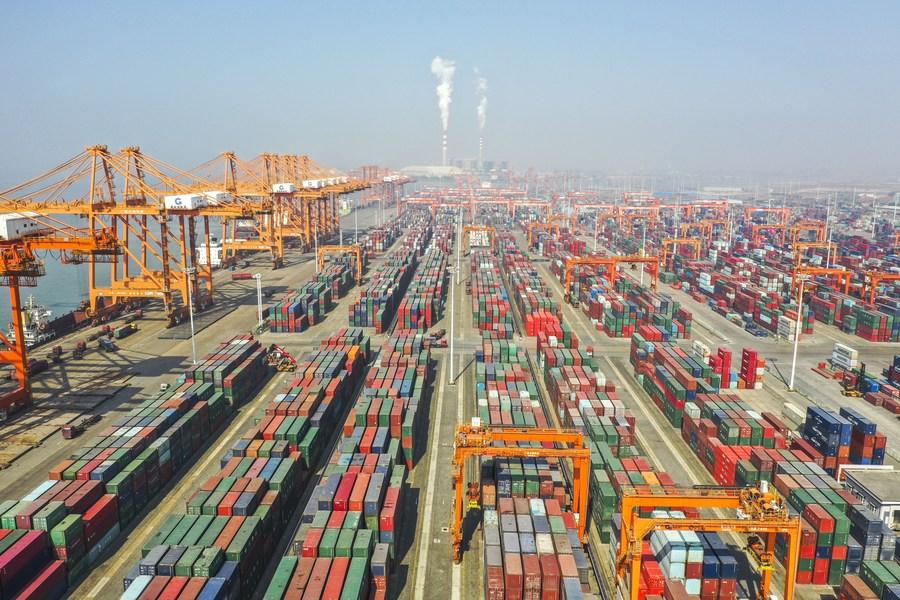
Aerial photo taken on Jan. 14, 2021 shows the container terminal of Qinzhou Port in south China's Guangxi Zhuang Autonomous Region. (Xinhua/Cao Yiming)
BEIJING, July 14 (Xinhua) -- Foreign institutions are optimistic about China's economy in the second half (H2) of this year, with Chinese stock and bond markets both favored, reported Shanghai Securities News Wednesday.
In the first half (H1) of this year, China registered remarkable economic performance, with manufacturing investment growth turning positive, foreign trade data exceeding market expectations, consumption recovery still well supported, and monetary policies more flexible and accurate.
Statistics released on Tuesday showed that in June, China's imports and exports stood at 3.29 trillion yuan, a year-on-year increase of 22 percent, far exceeding market expectations and catching the eyes of many foreign institutions.
Foreign institutions generally believe that China's economy will gradually stabilize after a strong rebound in H2, and multiple international organizations have recently raised expectations for China's economic growth.
The World Bank raised China's economic growth forecast for 2021 from 8.1 percent to 8.5 percent, and the International Monetary Fund (IMF) predicted a 8.4-percent growth of China's GDP, 0.3 percentage point higher from its earlier prediction.
U.S. asset manager Vanguard expects China's annual economic growth in 2021 to be 8.7 percent, while Swiss investment bank Credit Suisse expects the figure to be 8.2 percent.
"China's economy is still quite strong. Due to base factors, China's economic growth will level off in H2, and targeted policy instruments will be used to support the real economy," said Hu Yifan, investment director and head of macroeconomics for the Asia Pacific region of UBS Wealth Management.
According to analysts from Fidelity International, a world's leading investment management company, China's macroeconomic policies will continue to focus on stability to hedge against long-term growth pressure, and structural adjustment will still be an important factor to promote subsequent economic growth.
As China's financial market has continued opening up and its economic prospects keep improving, foreign institutions show optimism about China's stock and bond markets.
"In the long run, A-shares are attractive in global stock markets. Due to the reasonable valuation of China's consumer sector and its unchanged long-term growth logic, optimism in the sector has continued. In addition, the core assets of the Chinese bond market are still worth exploring," said Zhou Wenqun, director of stock investment and fund manager in China of Fidelity International.
Standard Chartered Bank still regards Chinese stocks as core holdings. As net-zero decarbonization has gradually become the "main theme" of major economies, the cost reduction of new energy and the introduction of supporting policies will promote the growth of climate-related demand, and 5G, Internet of Things (IoT), financial technology and other areas of innovation are also worthy of attention, said Wang Xinjie, chief investment strategist of the Wealth Management Department of Standard Chartered China.
As the main channel for foreign capital to allocate Chinese assets, money invested from Hong Kong into the Chinese mainland through the stock connect programs continued to flow into the A-share market in H1. Data from Wind, a Shanghai-based provider of financial data and analysis tools, shows that in H1 of 2021, the cumulative net inflow of such money registered 223.66 billion yuan, setting a record high for the same period in the past five years.
(Edited by Wang Yuhang, Gu Shanshan with Xinhua Silk Road, gushanshan.1987@163.com)




 A single purchase
A single purchase









